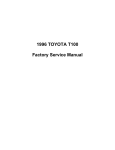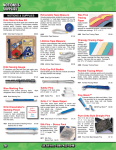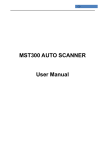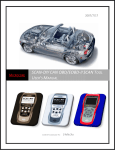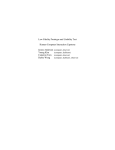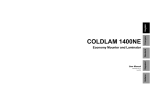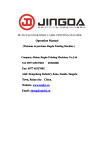Download 1063079 7th injector install
Transcript
URD 7th Injector System Installation For TRD’s 5VZ-FE Supercharger Legal in California only for racing vehicles, which may never be used upon a highway. Underdog Racing Development www.URDUSA.com INTRODUCTION: Thank you for choosing the URD’s 5VZ 7th Injector System. Over the last few years URD has offered upgrades to the 7th injector systems sold by TRD. URD’s customers have enjoyed the benefits of elimination of the high RPM lean out, increased power, smoothness, elimination of High Gear/Low RPM Ping (HG/LRPing), and the end user tunability. Although this is a new kit offered by URD, it really is not anything new. What we have done is just added our own additional injector, mount and fuel line to our existing 7th injector upgrade kit. The only thing new is that we now include the injector, fuel line and injector mount. Now you do not already have to own the TRD 7th Injector system to use the URD Upgrade Kit. We now we offer a complete kit in addition to our 7th injector upgrade kits and our complete 6injector fuel kits that have been around for years providing a complete range of performance options for your 5vz supercharger. The URD 5vz 7th Injector System with proper tuning can provide the needed fueling and knock control for our complete line of URD 5vz Supercharger SuperGrip Pulleys. If needed you can spread the installation of the components out over time. The vehicle will remain drivable as you continue to install the remaining components. Any questions, comments, or ideas, please mail URD Tech Support at [email protected] . PARTS LIST: Review the parts list and ensure you have all the parts prior to starting installation. If you are missing any parts contact URD at Support@URDUSA .com. URD Performance Calibration Unit – AIC/Timing Calibrator x1 Heat shrink tubing for AIC/Calibrator Installation x6 Assorted small and large wire ties Vehicle specific wiring connection guide for AIC/Timing Calibrator x1 Restrictor T fitting and nylon vacuum line for AIC/Timing Calibrator x1 Injector harness x1 Additional injector preassembled in injector mount x1 Gasket for injector mount x1 Socket headed cap screws (M8x20mm stainless) x2 Fuel line assembly with fuel line T fitting x1 (length dependant on supercharger Gen) x1 Version 1.1 © URD 2007 2/8/07 Page 2 of 31 [email protected] Underdog Racing Development www.URDUSA.com 190 LPH Fuel pump with install kit x1 160 degree thermostat x1 Two step cooler spark plugs x6 URD sticker x1 TOOLS NEEDED: Basic mechanic tools are needed to install this supercharger system. There are a few specialty tools that are needed for the installation. Quality soldering iron with solder Quality electrical tape Wire cutters Wire strippers Wire crimpers for fuel pump connections High quality electrical tap (3m) Heat gun to shrink heat shrink tubing 6mm allen socket for socket wrench Medium strength thread locker (Loctite) Floor and transmission jack for lowering fuel tank depending on truck version Small tubing cutter for fuel pump installation New engine coolant to refill after thermostat installation Version 1.1 © URD 2007 2/8/07 Page 3 of 31 [email protected] Underdog Racing Development www.URDUSA.com Prior to starting the installation, remove the negative battery terminal. INSTALLING THE FUEL PUMP: The replacement of the upgraded fuel pump requires removing the stock pump/tank unit assembly from the fuel tank. Accessing the tank unit is slightly different for different trucks. You should consult the Toyota Factory Service Manual (order from (800) 622-2033) for the proper procedure for removing the stock tank unit from the fuel tank. This installation guide is meant to supplement the Factory Service Manual. The fuel tank should be as empty as possible prior to the fuel pump installation. This will make it much easier to move and control the fuel tank and to prevent the spillage of fuel. The transmission jack you see in this guide was obtained from Harbor Freight. It is not expensive and will make dropping the fuel tank much easier for you. Fuel will be spilled during this process. You must take all the necessary precautions to catch spilled fuel, eliminate all possible ignition sources, assure proper ventilation , and have proper fire extinguishers available. Removing Fuel Tank Unit: 4Runner: 1. Depressurize the fuel system. Version 1.1 © URD 2007 2/8/07 Page 4 of 31 [email protected] Underdog Racing Development www.URDUSA.com A. Unplug the fuel tank harness connector. On the 4Runner you can access this connector by removing the inspection cover located under the left rear passenger seat. B. Start the engine and then let it idle until the engine stalls from lack of fuel, shut the ignition off, and remove the negative battery terminal. C. Remove the fuel filler cap to relieve vapor pressure. 2. Remove the fuel tank skid plate. Version 1.1 © URD 2007 2/8/07 Page 5 of 31 [email protected] Underdog Racing Development www.URDUSA.com 3. Mark the fuel lines on each side of the connection so you can reconnect the fuel lines properly later. There are two low pressure lines that look identical. One is a fuel return line from the engine, and one is a vent line. If you connect those improperly on reinstallation this will cause a serious problem. 4. Disconnect the two low-pressure lines by removing the spring clamps. Disconnect the high-pressure line using a flare nut wrench to prevent stripping the connector. Use a bucket to catch the fuel spilled from disconnecting the fuel lines. Version 1.1 © URD 2007 2/8/07 Page 6 of 31 [email protected] Underdog Racing Development www.URDUSA.com 5. Support the fuel tank with floor jack or transmission jack. 6. Remove the mounting bolts. Version 1.1 © URD 2007 2/8/07 Page 7 of 31 [email protected] Underdog Racing Development www.URDUSA.com 7. Lower the front of the fuel tank enough to allow access to the tank unit bolts. Lower the tank slowly and look for a second wire harness that is attached to the top of the tank and runs toward the rear of the vehicle. It is attached to the tank using a plastic tap and electrical tape. You can carefully cut the tape using a razor blade and free the harness from the tank. 8. Remove the tank unit and place it in a bucket to catch fuel that will drip from it. 9. Proceed to the fuel pump installation section. Tacoma Double Cab, T-100, Tundra: 1. Depressurize the fuel system. A. Unplug the fuel tank harness connector. On the Double Cab You may have to lower the front of the tank slightly to gain access to the harness connector. B. Start the engine and then let it idle until the engine stalls from lack of fuel, shut the ignition off, and remove the negative battery terminal. C. Remove the fuel filler cap to relieve vapor pressure. 2. Remove the fuel tank skid plate. Version 1.1 © URD 2007 2/8/07 Page 8 of 31 [email protected] Underdog Racing Development www.URDUSA.com 3. Disconnect the fuel filler from the bedside and check for any other brackets that may support the filler tube and remove them. 4. Support the fuel tank with floor jack or transmission jack. 5. Remove the mounting bolts. Version 1.1 © URD 2007 2/8/07 Page 9 of 31 [email protected] Underdog Racing Development www.URDUSA.com 6. Lower the front of the fuel tank enough to allow access to fuel line connection. The fuel lines are connected to the tank unit hard lines with plastic quick disconnects. Pay close attention to the orientation of the plastic locking collar so you will remember how to properly reinstall it. 7. Remove the plastic retaining clips and disconnect the fuel high pressure and return lines. Use a bucket to catch the fuel spilled from disconnecting the fuel lines. 8. Lower the front of the tank enough to access the bolts to the tank unit and remove them all. Version 1.1 © URD 2007 2/8/07 Page 10 of 31 [email protected] Underdog Racing Development www.URDUSA.com 9. Lift the tank unit from the fuel tank and place it into a bucket to catch the fuel dripping from the tank unit. 10. Proceed to the fuel pump installation section. Standard / Access Cab Tacoma: Version 1.1 © URD 2007 2/8/07 Page 11 of 31 [email protected] Underdog Racing Development www.URDUSA.com 1. Disconnect the fuel filler hose from the bedside and look for any additional mounted brackets and remove them. 2. There are six mounting bolts that attach the bed to the frame with three on each side. Remove the bolts on the driver’s side and loosen the ones on the passenger side as far as you can while still leaving them attached to the bed. 3. Disconnect the bed wire harness from the frame where it attaches near the rear bumper on the driver’s side. 4. Pad the area between the cab and the bed and lift the driver’s side of the bed high enough to allow access to the tank unit. Support the bed with a crane or a secure support. 5. Depressurize the fuel system. A. Unplug the fuel tank harness connector. B. Start the engine and then let it idle until the engine stalls from lack of fuel, shut the ignition off, and remove the negative battery terminal. C. Remove the fuel filler cap to relieve vapor pressure. Version 1.1 © URD 2007 2/8/07 Page 12 of 31 [email protected] Underdog Racing Development www.URDUSA.com 6. The fuel lines are connected to the tank unit hard lines with plastic quick disconnects. Pay close attention to the orientation of the plastic locking collar so you will remember how to properly reinstall it. 7. Remove the plastic retaining clips and disconnect the fuel high pressure and return lines. Use a bucket to catch the fuel spilled from disconnecting the fuel lines. 8. Lift the tank unit from the fuel tank and place it into a bucket to catch the fuel dripping from the tank unit. Version 1.1 © URD 2007 2/8/07 Page 13 of 31 [email protected] Underdog Racing Development www.URDUSA.com 9. Proceed to the fuel pump installation section. Fuel Pump Installation: 1. Unplug the wire harness from the fuel pump. 2. Undo the spring clamps that secure the fuel line and slide the fuel line off of the pump. 3. Remove the fuel pump from the support bracket. Version 1.1 © URD 2007 2/8/07 Page 14 of 31 [email protected] Underdog Racing Development www.URDUSA.com 4. Use the pipe cutter and shorten the hard pipe by approximately ½” and debur the end of the pipe and flush any debris from the pipe. 5. Install the fuel inlet sock onto the fuel pump and secure it with the small retaining clip. Use a very small socket to press it onto the tit on the fuel pump to be sure it goes on nice and straight. 6. Insert the new rubber bushing into the tank bracket. 7. Shorten the new fuel line to the proper length. Slip the new fuel line over the hard pipe and slide the two clamps over the line. 8. Insert the new fuel pump into the rubber bushing and slide the fuel line onto the pump discharge port. 9. Make sure the pump is sitting firmly in the rubber bushing and secure the fuel line clamps. Tug on the pump and make sure it is secure in the bushing and will not fall out. 10. Snap the new harness plug into the top of the pump. Version 1.1 © URD 2007 2/8/07 Page 15 of 31 [email protected] Underdog Racing Development www.URDUSA.com 11. Carefully cut the stock harness and the new harness so they are the proper length to fit the assembly. It is better to have them a little to long then to short. 12. Strip the ends and use the included butt crimp connectors to attach the wires. These connectors are designed to be submerged in gasoline. The red wire on the new harness connects to the blue wire on the stock harness. 13. Reinstall the tank unit into the fuel tank and reinstall the tank in reverse order of removal. Torque the tank unit screws to 30 inch pounds. 14. Do not start the engine and test for leaks now. Wait until after the 7th injector and its fuel line is installed. This will keep the fuel system depressurized for that step. INSTALLING 7th INJECTOR AND FUEL LINE: The additional injector that is used to supplement the fuel to the supercharged engine uses a special mount that is machined to fit the EGR port on the supercharger. Fuel is introduced in through the EGR port. Most years of the 5vz do not have an EGR system and the EGR port on the supercharger is blocked off with a cover plate. Version 1.1 © URD 2007 2/8/07 Page 16 of 31 [email protected] Underdog Racing Development www.URDUSA.com Some of the earlier Tacoma trucks do and if your truck is equipped with an EGR system this 7th injector system is not going to work for you. URD can source parts for you so that you can do a custom injector installation in the intake tube forward of the throttle body Mounting the Injector: The two different versions of the supercharger have different EGR port locations. st This is the location of the EGR port and where the URD injector will be installed on the 1 Gen TRD Supercharger. It is on the driver’s side next to the brake booster. Version 1.1 © URD 2007 2/8/07 Page 17 of 31 [email protected] Underdog Racing Development www.URDUSA.com nd This is the location of the EGR port on the 2 Gen TRD Supercharger and where the URD injector will be mounted. It is on the firewall side of the supercharger just aft of the throttle body. 1. Locate the EGR port of your model supercharger. 2. Remove the block off plate and clean the port of any sealant or gasket that may be left behind. The 2nd Gen supercharger uses studs. They will need to be removed. The end of the studs is configured so a 5/32” allen wrench can be inserted and used to remove the studs. 3. Install the injector mount with the included gasket so the injector plug and fuel fitting are facing upward. Secure it with the provided socket headed cap screws using a 6mm allen wrench. Use a medium strength threadlocking compound (Loctite) on the threads of the mounting bolts. Install the fuel line: Version 1.1 © URD 2007 2/8/07 Page 18 of 31 [email protected] Underdog Racing Development www.URDUSA.com 1. Locate the high-pressure fuel line and cut it in the location shown. Then remove about 1.5” more line from one end. 2. Make sure the fuel line nipples are tight. Insert the T fitting as shown and use the provided worm clamps to secure the stock high-pressure line only. A clamp is not needed on the provided fuel line. 3. Connect the provided fuel injector hose assembly to the T fitting and run it to the injector mount. This connection is an AN fitting. Tighten so it is hand tight and then use a wrench and turn it ¼ turn more. No sealant of any kind is needed for this connection. Version 1.1 © URD 2007 2/8/07 Page 19 of 31 [email protected] Underdog Racing Development www.URDUSA.com 4. Connect the fuel line to the injector mount and tighten it hand tight (the 2nd Gen Supercharger uses a 90 degree fitting on the fuel injector end). Then use two wrenches. One of the AN adapter fitting attached to the injector mount and one on the hose fitting. Hold the AN adapter still and tighten the hose fitting ¼ turn. 5. Make sure the fuel line is routed so it will not chafe or interfere with any other component. 6. Inspect all the fuel connections. Reconnect the battery and start the engine. Let it run for just a few seconds and shut it down. Inspect the entire fuel system for leaks. Disconnect the negative battery terminal again and proceed with the rest of the installation. INSTALL THE PERFORMANCE CALIBRATION UNIT: The URD Performance Calibration Unit - AIC/Timing Calibrator is the heart of the URD 7th injector system. It recalibrates your engine control system to optimize fuel mixture and ignition timing for best performance and drivability from your supercharged truck. The AIC/Timing Calibrator must be installed inside the vehicle and preferably in the dash. It should not be installed in the engine compartment. It must be wired into your ECU harness and connected to the supercharger boost port to function correctly. Version 1.1 © URD 2007 2/8/07 Page 20 of 31 [email protected] Underdog Racing Development www.URDUSA.com The following steps will guide you through the proper installation of the AIC/Timing Calibrator. The wiring connections are different for each year and vehicle and a vehicle specific wiring connection guide is also included in a separate document. Mounting the Calibration Unit: 1. The mounting location for the AIC/Timing Calibrator is a matter of personal preference. You will have to decide where you wish to mount it. A few suggested locations are: A. Inside of the dash behind the interment cluster. B. Inside the dash behind the glove box. C. Inside the glove box. D. Inside the console. Version 1.1 © URD 2007 2/8/07 Page 21 of 31 [email protected] Underdog Racing Development www.URDUSA.com E. Inside the lower passenger kick panel. 2. Once you have a location decided on secure it and run the wire harness to the ECU located behind the glove box. 3. Make the necessary wiring connections. All connections must be soldered. The use of crimp connectors is not recommended as they normally result in faulty connections. Version 1.1 © URD 2007 2/8/07 Page 22 of 31 [email protected] Underdog Racing Development www.URDUSA.com A. Secure the wire harness firmly to a good attachment point above the ECU. B. Make the proper wiring connections as directed in the included vehicle specific connection guide. Version 1.1 © URD 2007 2/8/07 Page 23 of 31 [email protected] Underdog Racing Development www.URDUSA.com This is an example of a TAP connection. Notice how the insulation has been pealed back on the White wire w/Black Stripe to expose the wire. The Black PCU wire has been wrapped around the first wire and then soldered to complete the connection. The connection should then be wrapped in high quality electrical tape (3M). Then a wire tie should be wrapped around the tape to ensure it can never come off. You can see a completed TAP connection where the Yellow w/Black Stripe PCU wires have been tapped into Black w/Yellow Stripe ECU wire. Version 1.1 © URD 2007 2/8/07 Page 24 of 31 [email protected] Underdog Racing Development www.URDUSA.com This is an example of a splice connection. Note how the crank signal wire has been cut. That leaves two ends of the wire. That signal must be passed through the PCU to be modified. So in this picture the wire without the stripe is soldered to the signal wire and carries that signal into the PCU. The signal is modified and then comes out of the PCU and is soldered to the wire going to the ECU plug. Each PCU and engine ECU is different. Follow the vehicle specific connection guide for your PCU and ECU to get the correct wire color codes and plug and pin location. Connecting the Injector Harness: The best place to pass the injector harness and vacuum line through the firewall is through the main wire harness boot. Unbolt it and undo the electrical tape, then run the injector harness and vacuum line through the boot and retape the boot junction. Version 1.1 © URD 2007 2/8/07 Page 25 of 31 [email protected] Underdog Racing Development www.URDUSA.com 1. The injector harness must be passed through the firewall and routed to the fuel injector. 2. The AIC/Timing Calibrators ship in two configurations, one with the injector harness connected to the Calibrator and one with the injector harness packaged separately. If it is attached you may need to cut the wires to pass it through the firewall and then reconnect with wires. If packaged separately, you will have to make the connections once the harness is passed through the firewall. 3. Plug the harness into the injector and route the harness to the firewall opening. Plug it onto the injector and properly route the harness back to the firewall opening. Secure it as necessary to prevent it from interfering with any other component and to prevent it from chafing. 4. Solder the injector harness to the Calibrator using the heat shrink tubing to insulate the connections. Connect the Vacuum Line: 1. The vacuum line on the AIC/Timing Calibrator must be connected to the boost port on the supercharger for proper operation. Version 1.1 © URD 2007 2/8/07 Page 26 of 31 [email protected] Underdog Racing Development www.URDUSA.com nd This is the location of the fuel pressure regulator and the boost port on the 2 Gen TRD Supercharger. You can see the proper routing of the vacuum line. The 2nd Gen supercharger ships with the boost port plug with a removable plug. If yours is still plugged you will need to obtain a nipple that is threaded for 1/8” NPT sized properly for the vacuum line and install it. Seal the threads with Teflon sealing tape. Version 1.1 © URD 2007 2/8/07 Page 27 of 31 [email protected] Underdog Racing Development www.URDUSA.com st This is the location of the boost port on the 1 Gen TRD Supercharger. It is the nipple just above the T in TRD. 2. Locate the fuel pressure regulator located on the rear of the driver’s side fuel rail. Connect a vacuum line to the top of the fuel pressure regulator and run it to the boost port on the supercharger. Plug the vacuum line that was originally connected to the fuel pressure regulator. Version 1.1 © URD 2007 2/8/07 Page 28 of 31 [email protected] Underdog Racing Development www.URDUSA.com 3. Now cut that vacuum line you installed between the fuel pressure regulator and the boost port and insert the URD Restrictor T-Fitting that was included with your kit. The restrictor molded into the T-Fitting is designed to dampen the supercharger impeller pulse from traveling to the AIC/Timing Calibrator. If you hear the AIC/Timing Calibrator buzz when in boost you have not installed this restrictor T-Fitting properly. Note: If you have a boost gauge, it should also be T-ed into this same vacuum line. 4. Route the nylon vacuum line through the firewall and connect it to the vacuum line on the AIC/Timing Calibrator. Version 1.1 © URD 2007 2/8/07 Page 29 of 31 [email protected] Underdog Racing Development www.URDUSA.com INSTALL THERMOSTAT (Optional): 1. Drain the engine coolant from the coolant drain in the lower part of the radiator. 2. Disconnect the lower radiator hose. 3. Remove the thermostat A. Remove the three nuts, wire clamp, and water inlet pipe from the water pump B. Remove the thermostat. 4. Remove the gasket from the thermostat and inspect it. If it is undamaged transfer it to the included 160 Degree thermostat. If it is not suitable for reuse replace it with a stock gasket from the Toyota dealer or one from your local auto parts store (Fel-Pro part number 35445). 5. Install the new thermostat and the rest of the components in reverse order of removal. 6. Refill the engine coolant. WARNING. If you have the TRD Dynamic tensioner you will have to unbolt the dipstick tube bracket before removing the belt. Do not pull the tube out of the block, just lean it over toward the alternator and out of the way. If you pull it out Version 1.1 © URD 2007 2/8/07 Page 30 of 31 [email protected] Underdog Racing Development www.URDUSA.com you will allow the oil pan to fill with engine coolant when you remove the thermostat. If you think that coolant may have gotten into the pan, change the oil before starting the engine. INSTALL SPARK PLUGS: 1. Remove the current spark plugs. 2. Check the gap on the new spark plugs using a wire type feeler gauge. Adjust to .043”. Use the proper gap adjusting tool and do not pry off of the center electrode. 3. Install the new sparkplugs and torque to 13 lb-ft. TUNE: The systems ship with a preloaded startup map to speed your tuning. You as the end user are responsible to ensure proper tuning. Download the U-Tune AIC Tuning Guide from www.GadgetOnline.com/u -tune-aic.pdf Version 1.1 © URD 2007 2/8/07 Page 31 of 31 [email protected]































